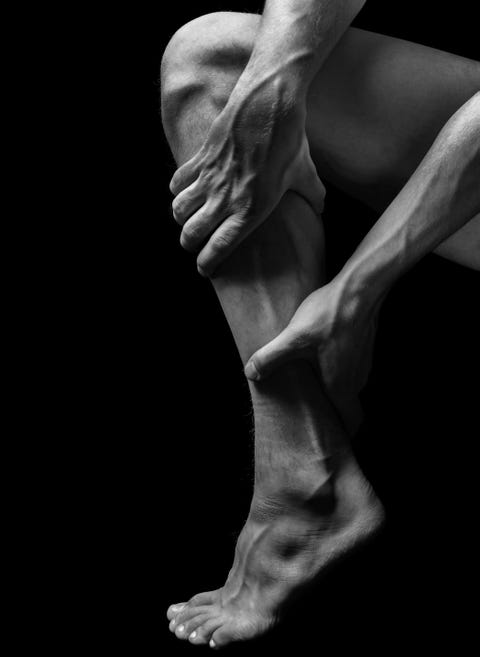How to Get Rid of Leg Cramps at Night

Sergey Borodin / EyeEm Getty Images
Having your leg or calf seize in the middle of the night is a pretty brutal way to wake up. Of course, a charley horse is pretty painful any other time, too.
The pain of a charley horse—which refers to any cramp or involuntary spasm of a muscle—is triggered by the spasm and balling up of your muscles, says Michael Jaffee, M.D., neurologist at the University of Florida Health.
"This can last from seconds to minutes, with an average of nine minutes, followed by several hours of soreness and possible discomfort for two to three days," he says.
If you suffer from leg cramps, you're not alone. About 60 percent of Americans report having nocturnal leg cramps, according to the American Academy of Family Physicians.
So what causes a charley horse to happen in the first place, and how can you avoid it or stop it when it has you in its grips? Here's what top docs have to say about it.
This content is imported from {embed-name}. You may be able to find the same content in another format, or you may be able to find more information, at their web site.
What causes a charley horse?
For something so painful, you would think scientists would know what exactly is to blame for your leg cramps. There's no single answer, but there are some theories.
You commonly hear that cramps are caused by dehydration or an electrolyte imbalance. Those might play some sort of role, but it's likely they're likely not the main culprits.
Does that mean you shouldn't eat bananas to ward off a charley horse? Consuming them probably isn't your main strategy, even though they do contain the electrolyte potassium, and you should always have enough of that mineral on board. (Other sources of potassium include starchy vegetables, legumes, and other fruits.) Same with foods that contain magnesium, another important electrolyte. It's important to have enough, but loading up on extra probably won't save you the difficult charley horse wake-up call. (Find magnesium in leafy vegetables such as kale and Swiss chard as well as broccoli, squash, nuts, seeds, and legumes.)
New thinking is that a charley horse is more of a neuromuscular problem—for some reason, your skeletal muscles over-fire and bunch up into what you know as a cramp. Again, cramps haven't given up their secrets yet, but scientists think there's likely there's more than one reason they occur. A few possible reasons your muscles are over-firing and giving you leg cramps:
- Your muscles are overloaded or fatigued, or just challenged in new ways.
- There may be structural or mechanical causes, like flat feet or circulation problems, says Christopher Hogrefe, M.D., an assistant professor of orthopedic surgery at Northwestern Medicine. There's also been a link between leg cramps and prolonged sitting, or sitting in an awkward position—which might be messing with the circulation in your legs.
- Your meds could be triggering a charley horse. "Some medications, including diuretics, asthma medications, and statins for cholesterol have also been believed to cause them," says Dr. Hogrefe.
- Leg cramps may be linked to more serious problems including muscle disease (myopathies), nerve disease (neuropathies), motor neuron disease (ALS), and Parkinson's disease, says Dr. Jaffee.
Weirdly, charley horses do seem to be a little bit seasonal: A 2015 study from the University of Alberta found that leg cramp symptoms doubled in the summer.

Remains Getty Images
How to stop leg cramps fast
Even if experts don't quite know why you get a charley horse, they do have some recommendations on how to stop them so you can relieve the pain and get on with your life (or sleep).
Stretch it out.
"You should forcefully stretch the affected muscle. For calf spasm or charley horse, point the toes of the affected leg toward your head while keeping the knee extended," says Dr. Jaffee.
Take a bath.
A change in temperature, such as a hot shower or an ice bath, can help you get rid of a charley horse.
Consider pickle juice or capsaicin.
A 2010 study found that drinking pickle juice within 35 seconds of the start of leg cramps reduced them 40 faster than drinking water did. While many people think the sodium in that juice is responsible for the effect, says Nicole Nelson, adjunct instructor in clinical and applied movement sciences at Brooks College of Health at the University of North Florida, but relief comes too quickly for sodium to have been absorbed in your system, she explains. (Check out her tips for avoiding and chasing toe cramps, too.) This might be because pickle juice triggers a reflex in the region in your throat, reducing the neurons involved in cramping muscles. Capsaicin—the stuff that puts the hot in hot peppers—may do the same thing when it hits your mouth and throat. While neither feels like a perfect middle-of-the-night food or drink, science has found that they may help, so it might just be a matter of how badly you want to get rid of them.
This content is created and maintained by a third party, and imported onto this page to help users provide their email addresses. You may be able to find more information about this and similar content at piano.io
How to Get Rid of Leg Cramps at Night
Source: https://www.menshealth.com/health/a19546964/leg-cramps-at-night-fix/